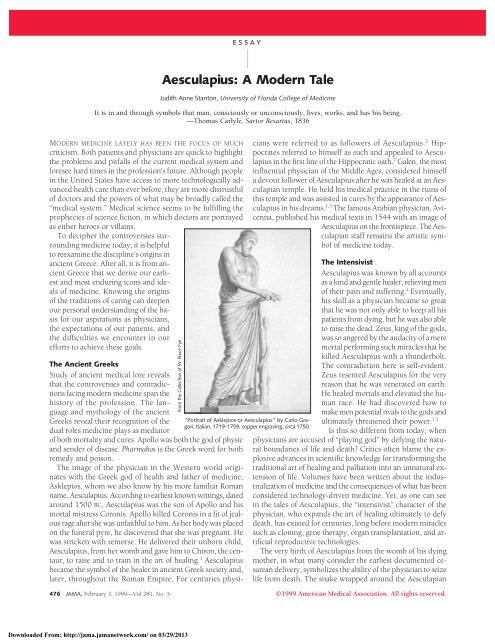JMS0203
JMS0203
JMS0203
You also want an ePaper? Increase the reach of your titles
YUMPU automatically turns print PDFs into web optimized ePapers that Google loves.
ESSAY<br />
Aesculapius: A Modern Tale<br />
Judith Anne Stanton, University of Florida College of Medicine<br />
It is in and through symbols that man, consciously or unconsciously, lives, works, and has his being.<br />
—Thomas Carlyle, Sartor Resartus, 1836<br />
MODERN MEDICINE LATELY HAS BEEN THE FOCUS OF MUCH<br />
criticism. Both patients and physicians are quick to highlight<br />
the problems and pitfalls of the current medical system and<br />
foresee hard times in the profession’s future. Although people<br />
in the United States have access to more technologically advanced<br />
health care than ever before, they are more distrustful<br />
of doctors and the powers of what may be broadly called the<br />
“medical system.” Medical science seems to be fulfilling the<br />
prophecies of science fiction, in which doctors are portrayed<br />
as either heroes or villains.<br />
To decipher the controversies surrounding<br />
medicine today, it is helpful<br />
to reexamine the discipline’s origins in<br />
ancient Greece. After all, it is from ancient<br />
Greece that we derive our earliest<br />
and most enduring icons and ideals<br />
of medicine. Knowing the origins<br />
of the traditions of caring can deepen<br />
our personal understanding of the basis<br />
for our aspirations as physicians,<br />
the expectations of our patients, and<br />
the difficulties we encounter in our<br />
efforts to achieve these goals.<br />
The Ancient Greeks<br />
Study of ancient medical lore reveals<br />
that the controversies and contradictions<br />
facing modern medicine span the<br />
history of the profession. The language<br />
and mythology of the ancient<br />
Greeks reveal their recognition of the<br />
dual roles medicine plays as mediator<br />
of both mortality and cures. Apollo was both the god of physic<br />
and sender of disease. Pharmakos is the Greek word for both<br />
remedy and poison.<br />
The image of the physician in the Western world originates<br />
with the Greek god of health and father of medicine,<br />
Asklepios, whom we also know by his more familiar Roman<br />
name, Aesculapius. According to earliest known writings, dated<br />
around 1500 BC, Aesculapius was the son of Apollo and his<br />
mortal mistress Coronis. Apollo killed Coronis in a fit of jealous<br />
rage after she was unfaithful to him. As her body was placed<br />
on the funeral pyre, he discovered that she was pregnant. He<br />
was stricken with remorse. He delivered their unborn child,<br />
Aesculapius, from her womb and gave him to Chiron, the centaur,<br />
to raise and to train in the art of healing. 1 Aesculapius<br />
became the symbol of the healer in ancient Greek society and,<br />
later, throughout the Roman Empire. For centuries physi-<br />
From the Collection of W. Bruce Fye<br />
cians were referred to as followers of Aesculapius. 2 Hippocrates<br />
referred to himself as such and appealed to Aesculapius<br />
in the first line of the Hippocratic oath. 2 Galen, the most<br />
influential physician of the Middle Ages, considered himself<br />
a devout follower of Aesculapius after he was healed at an Aesculapian<br />
temple. He held his medical practice in the ruins of<br />
this temple and was assisted in cures by the appearance of Aesculapius<br />
in his dreams. 1,3 The famous Arabian physician, Avicenna,<br />
published his medical texts in 1544 with an image of<br />
Aesculapius on the frontispiece. The Aesculapian<br />
staff remains the artistic symbol<br />
of medicine today.<br />
The Intensivist<br />
Aesculapius was known by all accounts<br />
as a kind and gentle healer, relieving men<br />
of their pain and suffering. 2 Eventually,<br />
his skill as a physician became so great<br />
that he was not only able to keep all his<br />
patients from dying, but he was also able<br />
to raise the dead. Zeus, king of the gods,<br />
was so angered by the audacity of a mere<br />
mortal performing such miracles that he<br />
killed Aesculapius with a thunderbolt.<br />
The contradiction here is self-evident.<br />
Zeus resented Aesculapius for the very<br />
reason that he was venerated on earth.<br />
He healed mortals and elevated the human<br />
race. He had discovered how to<br />
make men potential rivals to the gods and<br />
ultimately threatened their power. 1,3<br />
“Portrait of Asklepios or Aesculapius” by Carlo Gregori,<br />
Italian, 1719-1759, copper engraving, circa 1750.<br />
Is this so different from today, when<br />
physicians are accused of “playing god” by defying the natural<br />
boundaries of life and death? Critics often blame the explosive<br />
advances in scientific knowledge for transforming the<br />
traditional art of healing and palliation into an unnatural extension<br />
of life. Volumes have been written about the industrialization<br />
of medicine and the consequences of what has been<br />
considered technology-driven medicine. Yet, as one can see<br />
in the tales of Aesculapius, the “intensivist” character of the<br />
physician, who expands the art of healing ultimately to defy<br />
death, has existed for centuries, long before modern miracles<br />
such as cloning, gene therapy, organ transplantation, and artificial<br />
reproductive technologies.<br />
The very birth of Aesculapius from the womb of his dying<br />
mother, in what many consider the earliest documented cesarean<br />
delivery, symbolizes the ability of the physician to seize<br />
life from death. The snake wrapped around the Aesculapian<br />
476 JAMA, February 3, 1999—Vol 281, No. 5 ©1999 American Medical Association. All rights reserved.<br />
Downloaded From: http://jama.jamanetwork.com/ on 03/29/2013



